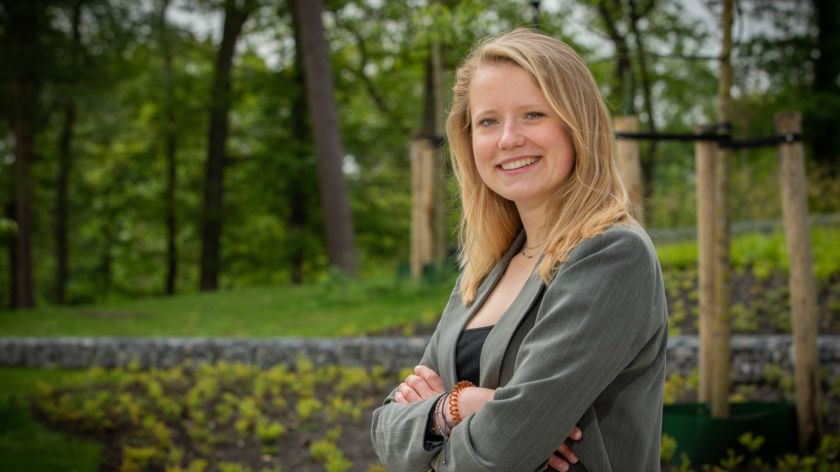The Dutch ‘polder model’ suits Isabelle Kik, leader of AKKUraatd
-
 Isabelle Kik of AKKUraatd. Photo: David van Haren
Isabelle Kik of AKKUraatd. Photo: David van Haren
From May 31st to June 3rd, students can vote for the University Student Council (USR). Vox meets the leaders of both parties to talk about their plans. Today: Isabelle Kik (AKKUraatd) who wants to get rid of the binding study advice.
Isabelle Kik (23), master’s student constitutional law and administrative law, grew up in Amersfoort and moved to Nijmegen when she was eighteen. She gained experience in the Education Committee and Faculty Student Council. Now, she’s ready for the big stage. ‘It’s really important that students are represented properly in the participational bodies.’
You asked to meet in front of the Berchmanianum. Why?
‘The student psychologists are seated here. They represent a pressing issue: student well-being. The corona crisis has had a huge impact on this. People feel lonely, have little bonding with the university. We will see a long-term effect even after the corona measures have softened. My main goal is to restore student well-being, for example by improving the accessibility of student psychologists or by focusing on prevention.’
The Executive Board has its office diagonally across from the psychologists. Should the board do better?
‘I would argue that the university is already committed to student welfare, as demonstrated by the implementation of the ‘Student Wellbeing 2023′ plan. However, we must remain vigilant to see what can be improved. I will be on top of that.’
AKKUraatd proposes to get rid of the binding study advice (bsa) and implement the personal study advice. What’s that?
‘Currently, students are required to get a minimum number of study credits in the first year. This causes a lot of stress and uncertainty for students, who themselves often want to continue into the second year. We believe that students themselves should be able to determine whether a study suits them. The role of the university is to provide personal advice. This will take away the stress caused by the bsa.’
The university says: the bsa helps decreasing study delay.
‘That’s right to some extent, but at the same time it leads to perverse effects. Because of the corona crisis, the bsa was suspended last year, although the university still provided an advice. 60 percent of the students who normally would have been removed, enrolled themselves this year again for the same study. So a substantial group wants to continue studying, despite the negative advice. I argue that students in other years should be given that opportunity as well.’
Your program states that ‘everyone has the right to get a third chance’. What exactly do you mean?
‘We have indeed cautiously worded this in our program. The bottom line is: if students risk delaying their studies for a year because they didn’t finish one exam, we believe they should get a standard third chance for that exam. This saves an extra year for students themselves. It is also good for the university, because it ensures quick throughput.’
There has been a lot of discussion about racism and diversity in the past year, but this topic isn’t named in your election program. Is diversity on the agenda of AKKUraatd?
‘Of course we think inclusivity and diversity are very important. Personally, I would say the university should leave no stone unturned to ensure everyone feels at home. Diversity is really commonplace for us, maybe that’s why we didn’t mention it explicitly. Inclusion does appear implicitly in our program. For instance, the idea that everyone is welcome underpins our pillar ‘Student life for everyone’.’
AKKUraatd has no international student on the list, while asap has a German party leader. Can a Dutch list properly represent international students?
‘I can only applaud that an international student is leading a fraction. We don’t have internationals on the list, but we have enough connections to make up for that. Our number three, Roel Veenstra, is very involved in this theme. I also want to emphasize: don’t vote for the person, but for the ideas. And I think all students agree with ours.’
What is your leadership style?
‘The Dutch polder model suits me. Of course you sometimes have to fight for your ideals, but I believe that you ultimately achieve the most by cooperating. I think we will work well with asap next year. I am also very proactive. When while dividing tasks everyone remains quiet, I am the one who raises a hand. Hopefully we can achieve a lot next year.’



